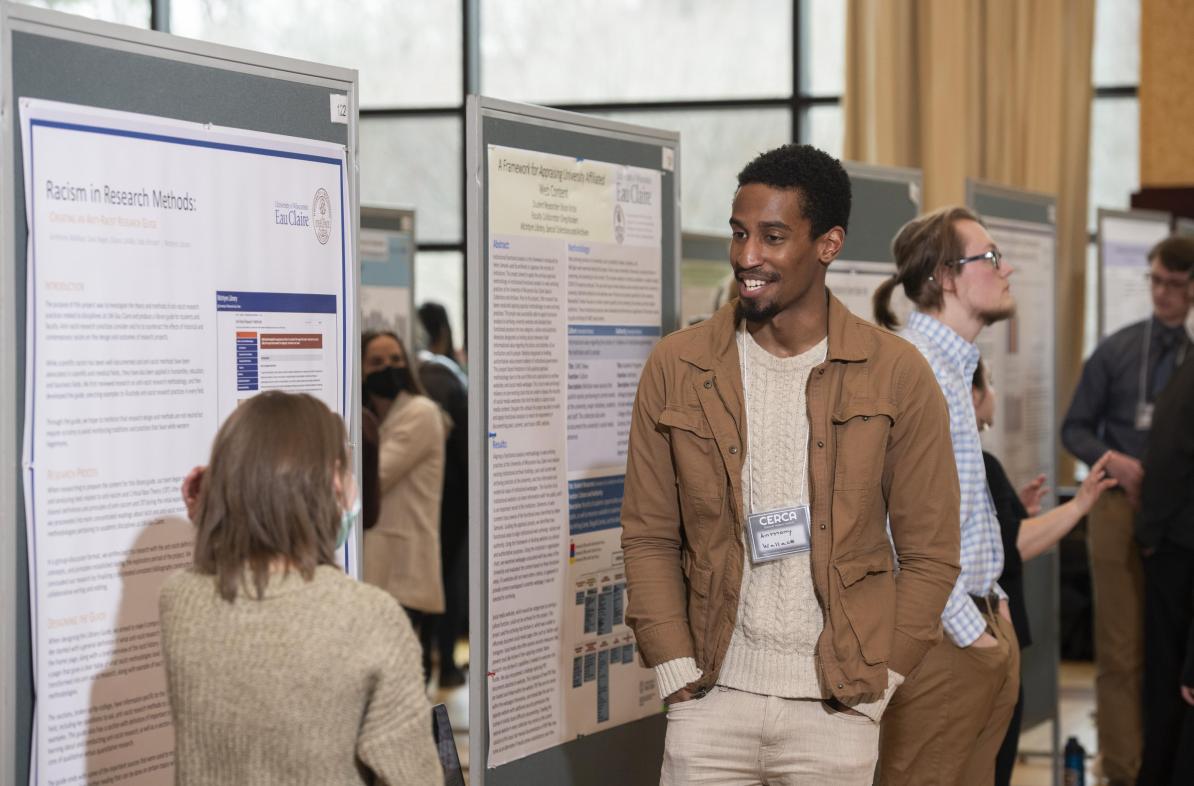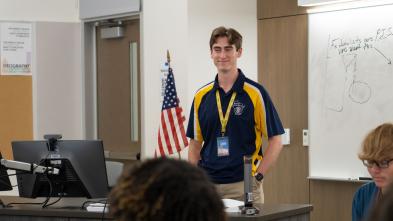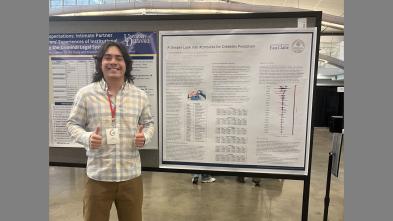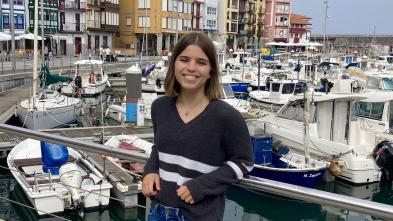
Rooted in theory, informed by experience: Anthony Wallace '22
As was the case for so many Americans, the summer of 2020 proved to be a key moment of self-realization for University of Wisconsin-Eau Claire English literature major Anthony Wallace.
In addition to the turmoil caused by the pandemic throughout 2020, the May 25 death of George Floyd, who was killed by police during an arrest in Minneapolis, and the weeks that followed immersed Wallace in a set of circumstances and observations that he says shaped his thinking about his education and the goals for his future.
“For something like that to happen so close to my hometown, I was just drawn to it; I knew I had to go,” says Wallace, who grew up and attended high school in nearby Eagan, Minnesota.
“I volunteered to collect donations and drive supplies from Eau Claire to the impacted neighborhoods in Minneapolis where stores were closed and necessities were in short supply,” says Wallace, who had just completed his third semester at UW-Eau Claire at that time, studies completed online after COVID-19 closed the campus.
“My friends and I became involved in protests and worked to distribute information materials. It was a huge experience for me.”
Wallace says that much of his studies and research as a Blugold student of literature and rhetoric have revolved around issues of race and racial identity, and his experiences in the events of that summer created a “light bulb moment” for him when he suddenly saw all the theory and subjects he studied in a new way.
“I stepped back and realized that all the theory I write about in studying race, all the intellectual work I’ve been doing certainly has intrinsic value, but it stems from real people’s lives,” Wallace says. “It’s informed by the real-life experiences of the groups and individuals who feel that marginalization most directly.”
Wallace says that the work he and his friends did in aiding Twin Cities neighborhoods during that summer, work that met critical needs in a moment of crisis, also served to prepare him mentally for the remainder of his academic path at UW-Eau Claire.
"Those experiences allowed me to reframe my studies and my work in a more practical manner,” Wallace says. “I can stand outside somewhere and hold a sign — I’ve done that — but I’ve realized that whatever I’m doing requires me to ask myself ‘how is this going to create change?’”
A change-making research project
Through a 2021 research project with faculty and staff in McIntyre Library, Wallace has been able to find just the kind of “practical” application for making change that he was seeking.
Wallace worked much of the summer of 2021 to create an online anti-racist research guide for use in McIntyre Library. The digital guide is available through the library guides on the website.
“Last summer, Anthony joined us to work on a summer research grant through ORSP,” says Kate Hinnant, head of library instruction and communication, and associate professor of women’s, gender and sexuality studies at UW-Eau Claire.
“We created an online guide to anti-racist research methods. Many research practices have emerged from a legacy of racism in academic disciplines, so we wanted to create a guide that would help students consciously think through their research design choices with an eye towards eliminating bias or exclusion. We wanted the guide to be applicable whether students' research was in the sciences, business, humanities or education.”
Wallace presented this project at UW-Eau Claire’s Celebration of Research and Creative Activity (CERCA) last month, alongside fellow student researcher Sara Nagel, a senior psychology major from New Richmond.
“CERCA presented an invigorating and functional space to disseminate our work and communicate its value to different university community members,” says Wallace, a first-time presenter at the annual event.
“The Anti-Racist Research Methods Library Guide is based in our team's appreciation of interdisciplinary work and our own personal values of self-criticality and racial justice. To see these values and interests shared with Blugolds from a variety of disciplines and departments was both humbling and empowering. Students across disciplines will be able to find literature that introduces them to how scholars within their disciplines account for racism in the research process.”
Wallace added that since the guide was completed and published online, he has made use of its tools himself in subsequent research projects of his own, a process he found both “exciting and humbling.”
Planning a future in higher education
As Wallace plans for the next steps in life after receiving his Blugold degree on May 21, he says one thing is certain at this point — he plans to pursue a career in higher education.
“Graduate school is next, likely a program in rhetoric or cultural studies in English,” says Wallace, adding that an internship in the Dean of Students office helped solidify another aspect of his goals for the future.
Being a student of color at a predominantly white institution like UW-Eau Claire, Wallace says that he wants to do meaningful work that helps students like himself succeed in a system not always set up for their success, a system he admits he entered with somewhat of a strategic advantage.
“I attended a high school with demographics much like UW-Eau Claire; I came here knowing how to navigate an education system like this one,” Wallace says. “What I learned over time was that we lost students here who didn’t come in ‘speaking that language’ or knowing how to seek the resources they needed or establish connections with faculty that foster academic success.”
Wallace says that through administrative work and mentoring, he hopes to help more students of color in predominantly white institutions find the path to academic success that he was able to find.
“Often there is a slant where marginalized groups along lines of race and ethnicity are less likely to find full access to the lessons of how to succeed in predominantly white systems. There is work to do to change that.”
Dr. Kaia Simon, assistant professor of English, has been Wallace’s writing instructor for courses in his minor in the rhetoric of science, technology and culture. She says she’s familiar with his long-term goals and has no doubt that Wallace will be the agent of change he has already shown himself to be as a Blugold.
“Anthony will change the world. I have every confidence that this is true,” Simon says. “He is a young man with such integrity and ethical standards. Rhetoric is essentially the use of ethical communication to relay meaningful content. Anthony has learned how to use it exquisitely to reach the audiences he’s trying to influence to produce change.”
You may also like


